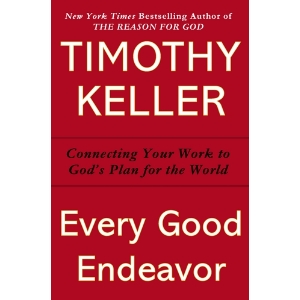Book Review: Every Good Endeavor
Timothy Keller, Every Good Endeavor: Connecting Your Work to God’s Work, Dutton Adult, 2012.
 I daresay that Every Good Endeavor is my favorite book this year. That’s #1 out of 40-something books I’ve read. If you could hear my mind while reading, you would hear this a lot: “YES!! THAT’S WHAT I’M TALKING ABOUT!!” Keller articulates things I’ve been thinking about for many years, and propels new thoughts in a thousand different directions.
I daresay that Every Good Endeavor is my favorite book this year. That’s #1 out of 40-something books I’ve read. If you could hear my mind while reading, you would hear this a lot: “YES!! THAT’S WHAT I’M TALKING ABOUT!!” Keller articulates things I’ve been thinking about for many years, and propels new thoughts in a thousand different directions.
The subtitle of the book is Connecting Your Work to God’s Work, relating secular work to the biblical worldview. There is hardly another topic that excites me as much as this. The central point of the book, paraphrased, is this: If the Gospel is true and its principles tenable, then it must not only work on the pulpit; it has to also work in the marketplace.
What Keller proposes is the application of Christian principles at work, not just in terms of personal integrity, faithfulness, and doing the best in every task, or even watching doors of opportunities to share the Gospel with co-workers. He argues that Christians should think about how these principles apply to the nature of the work itself – how can work advance the Gospel, how can my work teach others about the character of God?
Keller begins with examining how God works in creation and God’s plan for humanity’s work in the beginning. He then suggests that for work to have meaning, it has to be placed within a bigger life narrative – a worldview. My favorite section of the book is where Keller takes the Christian worldview and applies it to examples of different work areas. How would the Christian worldview influence how one does business, journalism, arts, medicine, etc. (unfortunately, no section on engineering), not by putting the crucifix everywhere, but more intrinsically in the business model, in the stories told, in the implied message of the painting, in the understanding of a human being made in the image of God. It is the Gospel applied.
In my community of faith, the medical field has a big stamp of approval, rightly so, because it couples so well with the work of the Gospel ministry. As a package, it offers people an entire healing, physically and spiritually. There’s no denying that doctors and nurses are noble professions, and their skills are indispensable in many mission fields. But it doesn’t mean that everyone should be a doctor. I mean, if, like me, the sight of blood makes you dizzy and someone explaining a surgical procedure makes you shiver, then for heaven’s sake DON’T be a doctor. I promise you’ll be doing the Gospel (and the world) a favor.
An unintended consequence of this endorsement in the church is that many young people aspire to become doctors and nurses without thinking about what God actually wants them to do in life, without asking what are their gifts and interests. Perhaps they would advance the Gospel much further if they were doing something else. As an engineer, along with many other non-doctors and non-nurses whose vocations are rarely addressed in the church (or even thought of as worldly), I ask the question, Is there not a place for my work in God’s kingdom? And I just don’t think “No” is the right answer to that question.
The biblical model of a Christian and Adventist lawyer, journalist, painter, architect, writer, engineer, social work, chef, businessman, financier, … is desperately, desperately needed. And I am quite adamant that my generation finds these models. If the Gospel needs to go to the entire world, then it is of necessity that it goes to all lines of work. We need to start doing something about this because the opportunity cost of not finding these biblical models gets bigger and bigger over time.
And so I’ve digressed from the book review. But this is the context of why I think Keller’s book is valuable. Part of me wished I had written this book. But that would require me to quit everything to do the research.
Every Good Endeavor is a must-read for professionals and young professionals, especially those who work in secular environments. It opens up new ways of thinking and challenges you to be creative for God. You’re already spending 40-100 hours per week for work. Make those hours count for God’s kingdom.
Originally published here.




